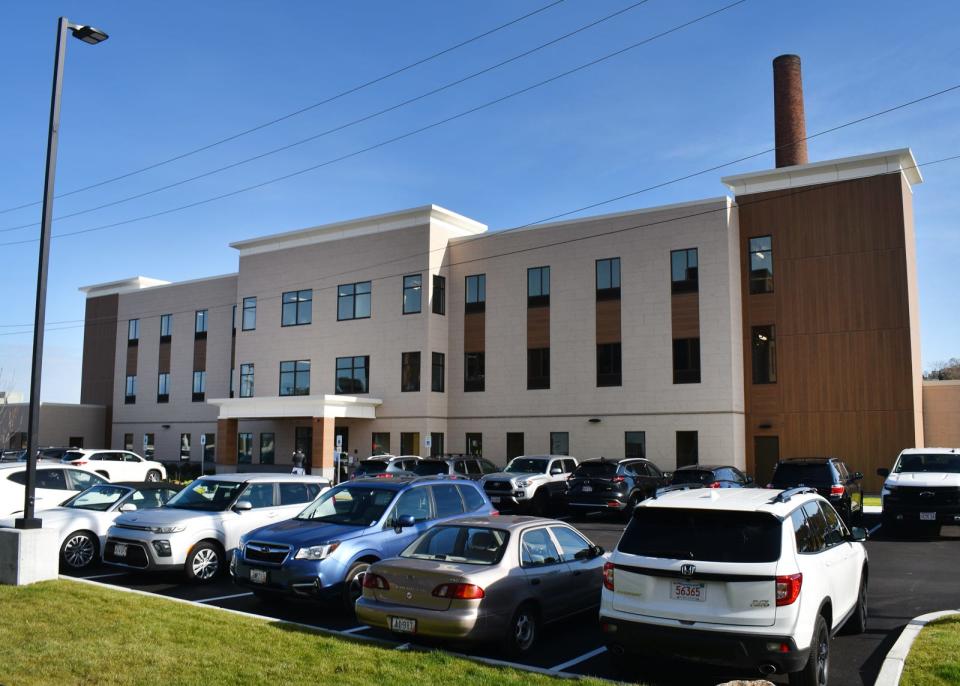A new Fall River drug and alcohol rehab center is still not accepting patients. Here's why
FALL RIVER — It’s been more than a year since Stanley Street Treatment and Resources (SSTAR) celebrated the opening of a bright new facility on Weaver Street, but the first patients have yet to walk through the doors. A legal battle is still holding up part of the building’s operation as a substance use treatment center.
“It impacts the community. Without these services, everybody who needs them doesn’t always get in,” said Sherry Ellis, SSTAR’s CEO. “We want to make sure we can serve everyone who needs it.”
SSTAR held a ceremonial ribbon cutting for its newest building in November of 2021. The three-story, $16 million building is designed to offer both primary care and treatment for substance use disorders, including 15 detox beds and 15 beds for medium-term inpatient substance use treatment. At the time, SSTAR planned to welcome the first patients to the building in January of 2022.
But, the city has refused to give SSTAR a permit to operate the detox and in-patient treatment beds, with the building inspector saying that use is not allowed under the area’s zoning as a commercial mill district.
SSTAR has argued the beds should be allowed because of the Dover Amendment, a part of the state’s laws that say local zoning bylaws cannot prohibit or regulate any use of property for educational purposes by a nonprofit educational corporation.

The building is now partially occupied, Ellis said, as SSTAR has begun moving administrative workers in and credentialing providers for the outpatient treatment facility. While the in-patient portion of the facility is still held up in court, the building is fully licensed to provide primary care and out-patient mental health and substance use treatment. Out-patient care will begin as soon as the medical providers are fully credentialed, hopefully within the next two months, Ellis said.
SSTAR has requested the needed permit for the 30 treatment beds four times and been denied each time, most recently at a Zoning Board of Appeals meeting in April of last year.
For subscribers:Gorgeous colonial in Westport on over 2 acres of land sells for $845K
SSTAR cites Dover Amendment educational exemption
Before the vote, Ellis and SSTAR attorney Richard Burke explained why they see SSTAR’s plans for the treatment beds to be part of an educational mission that should be exempt from zoning limitations under the Dover Amendment. During their time at the treatment center, clients would undergo a structured, nine-hour day of dialectical behavioral therapy and cognitive behavioral therapy and receive education geared toward helping people understand substance use disorder as a disease, what triggers it and how to avoid relapses.
“Everything we do at SSTAR is really educational because that’s the only thing that works, really, in the long-term,” Ellis said.
Burke said the concept of an educational facility allowed under the Dover Amendment must be interpreted as including non-traditional forms of education. He pointed to a case where the state’s Supreme Judicial Court allowed McLean Hospital in Belmont to move forward with a residential life skills program for people exhibiting extreme "emotional dysregulation.”
At the April meeting, the board voted 3-2 to uphold the city building inspector's decision. One board member who sided with SSTAR, James Calkins, said it seemed clear that the treatment beds are allowed under the Dover Amendment and that any decision to block them would likely be overturned in court later.

STARR asks court for summary judgement
SSTAR has taken the fight to Superior Court. In December, they requested a summary judgement that would allow the substance use treatment beds to move forward. Ellis said they expect a decision from the court to come down soon.
“We’re expecting it at any time,” she said.
And despite consistent efforts from the city to block the treatment beds, she’s confident that the court will side with SSTAR.
“The Dover Amendment is being upheld more and more in the state of Massachusetts,” she said.
Ellis stressed that the city and Mayor Paul Coogan have continued to work alongside SSTAR to help address the substance use crisis, despite the legal battle over the Weaver Street building. SSTAR provides Narcan and training on how to use it to Fall River first responders and works with the police department to send substance use workers on ride-alongs to follow up with people in the city who have overdosed.
“We have not allowed what the city has done with this particular issue to stop us providing services in the city of Fall River that people so desperately need,” Ellis said. “We haven’t done anything that would allow an adversarial relationship to develop with the city; that’s not who we are.”
This article originally appeared on The Herald News: SSTAR still waiting for court ruling on Weaver Street treatment center

